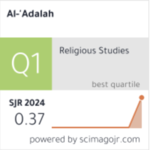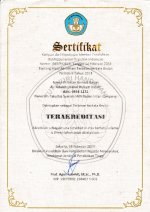Table of Contents
|
Mapping the National Insight of the Salafi Group in Indonesia Based on their Fatwa on Social Media
 Muhammad Ridha DS, Afridawati Afridawati, Nuzul Iskandar, Mursal Mursal
|
Muhammad Ridha DS, Afridawati Afridawati, Nuzul Iskandar, Mursal Mursal
| |
245-270
|
|
Analysis of Relationship between Religious Knowledge, Attitude, and Behaviour of Islamic Universities Female Students towards the Halalness of Cosmetic and Wear Products
 Fraulein Intan Suri, Henry Iwansyah
|
Fraulein Intan Suri, Henry Iwansyah
| |
271-298
|
|
The Tarjīḥ Method of Imām Nawāwi in Resolving Differences of Opinion in the Shāfi'ī School of Thought
 Abd. Manaf, Jamaluddin ., Zarkasyi ., Andri Nirwana, A.N., Mariam Elbanna
|
Abd. Manaf, Jamaluddin ., Zarkasyi ., Andri Nirwana, A.N., Mariam Elbanna
| |
299-322
|
|
The Role of Indonesian Women Ulama Congress (KUPI) in the Search for Gender Equality-Based Islamic Law
 Nur Faizah, Ahmad Rezy Meidina, Achmad Lubabul Chadziq, Moch. Iqbal, M. Shaiful Umam
|
Nur Faizah, Ahmad Rezy Meidina, Achmad Lubabul Chadziq, Moch. Iqbal, M. Shaiful Umam
| |
323-346
|
|
Legal Transformation of Indonesian Sharia Banks Towards Digital Banking in the Era of Industrial Revolution 4.0
 Qodariah Barkah, Romli SA, Muhamad Sadi Is, Andriyani Andriyani, A’dawiyah Bt Ismail
|
Qodariah Barkah, Romli SA, Muhamad Sadi Is, Andriyani Andriyani, A’dawiyah Bt Ismail
| |
347-370
|
|
The Implementation of the Maslahah Principle in Cultivating Religious Moderation in the State Islamic Universities
 Moh. Mukri, Agus Hermanto, Hanif Hanif, Is Susanto, Rochmad Rochmad
|
Moh. Mukri, Agus Hermanto, Hanif Hanif, Is Susanto, Rochmad Rochmad
| |
371-400
|
|
Analysis of Halal Certification for Micro and Small Business Actors from the Perspective of Maslahah Principles and Legal Certainty
 Endeh Suhartini, Euis Hertiani, R. Djuniarsono, Hidayat Rumatiga, Nurfajrina Sabila PM
|
Endeh Suhartini, Euis Hertiani, R. Djuniarsono, Hidayat Rumatiga, Nurfajrina Sabila PM
| |
401-426
|
|
Sheikh Nawawi al-Bantani’s Thoughts on The Rights and Obligations of Husband and Wife in His Book Entitled Uqūd al-Lujain fī Bayāni Huqūq al-Zaujain
 Ahmad Sanusi, Syifa Elrahmah Basya, Muhammad Ishom, Dian Febriyani, Edi Husin
|
Ahmad Sanusi, Syifa Elrahmah Basya, Muhammad Ishom, Dian Febriyani, Edi Husin
| |
427-448
|
|
Integrating Hybrid Sharia Contracts in Letter of Credit (L/C) Transactions for Export and Import in Islamic Banking in Indonesia
 Eva Sumanti, Camelia Sofwan Al-Rasyid, Pitriani Pitriani, Muhamad Izazi Nurjaman, Raid Alghani
|
Eva Sumanti, Camelia Sofwan Al-Rasyid, Pitriani Pitriani, Muhamad Izazi Nurjaman, Raid Alghani
| |
449-478
|
|
Adaptation of the Economic Order Quantity (EOQ) Model in the Perspective of Maqasid Shari’a
 Muhsin Muhsin, Irni Sri Cahyanti, Dwi Novita, Yayuk Sri Rahayu, Sadali Rasban
|
Muhsin Muhsin, Irni Sri Cahyanti, Dwi Novita, Yayuk Sri Rahayu, Sadali Rasban
| |
|







.png)
_(1).png)
_(1).png)

.png)
